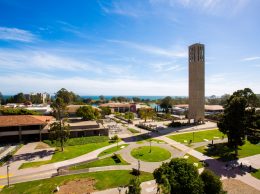Munger on a mission: Housing for 21st century scholars
IN THIS ARTICLE
- Latest news Topic
- Marissa Wenzke and Henry Dubroff Author
By Marissa Wenzke and Henry Dubroff Friday, October 31st, 2014

Charles Munger, vice chairman of Berkshire Hathaway, speaks during an event in Pasadena in 2011. (Bloomberg News photo)
Ranked No. 17 on the Chronicle of Philanthropy’s Top 50 individual donors for 2013, it’s clear that Berkshire Hathaway Vice Chairman Charles Munger, a frequent South Coast visitor, believes in the concept of a community of scholars.
Munger made headlines nationwide when he gave $65 million to UC Santa Barbara to fund a planned scholars residence for the Kavli Institute of Theoretical Physics, enlisting South Coast developer-financier-philanthropist Mike Towbes, whose Towbes Group will build the three-story project.
The gift, the largest in the university’s history, caps a roller-coaster year for UCSB, where a shooting rampage in Isla Vista shook the campus months ago and more recently, UCSB physics researcher Shuji Nakamura brought light to the university with a Nobel Prize in physics on Oct. 6.
Coming just a few weeks after the Nakamura award, news of the Munger gift first leaked when he filed with securities regulators to donate 100 shares of Berkshire Hathaway stock to UCSB.
The gift underscores the way that Munger’s philanthropy at times diverges sharply from that of Berkshire Hathaway’s more famous chairman, Warren Buffett. Buffett has pledged some $37 billion to the Bill and Melinda Gates Foundation, whose work eradicating disease in poor countries is world-renowned.
At the other end of the socioeconomic scale is Munger, who pledged $110 million last year to the University of Michigan for interdisciplinary housing for graduate students and fellows. He once studied at the campus as an undergraduate but did not graduate, later graduating from Harvard Law School after serving in the military.
In 2011, he gave $20 million to renovate housing for law students at the University of Michigan’s Ann Arbor campus. And his philanthropic efforts for well-endowed, top-notch schools reach back to 2004, when he and his wife donated $43.5 million for building residential halls at Stanford University.
Munger has said more than once that he believes housing is key to graduate education. “It’s very uncommon that administrations are much interested in creating dormitories because if you’re an elite place and you’ve got 10 applicants for every spot, it’s perfectly natural to think ‘Why the hell do we need to do any more for the students? They’re begging to get in,’ ” the San Francisco Chronicle once quoted him saying. “I don’t think you abuse your best customers merely because you can get away with it.”
The Kavli Institute, named after the late Fred Kavli whose Moorpark-based company was a leading producer of circuit boards and advanced electronics, will not suffer from vacancies or reach out to other departments to keep it full, according to the institute’s director, Lars Bildsten.
“The amount of visitors we have at the KITP is such that we really expect the building to be full, with 60 to 80 visitors at a time,’’ he told the Business Times.
The new building, which will be 75,000 square feet, will likely be filled to the brim with visitors to the Kavli Institute, he said. Featuring apartments with kitchens and bathrooms located in each one, the new building will also include some common study and lounge areas.
Most Kavli Institute visitors are faculty from other universities and independent researchers; however, some graduate students and Ph.D. candidates also visit the institute. No undergraduates will live at the new facility and there are no future plans to introduce undergraduates to the new building or any similar facility.
Bildsten was coy about whether the building will be named after Munger, saying, “We’re still letting that play out.”
But Munger, at age 90, continues to roll up his sleeves and get involved in a way that goes way beyond writing checks, Bildsten said, adding that he doesn’t just put monetary resources into the gift but also “time, energy and thought.” The multi-billionaire played a key role in the upcoming UCSB building’s planning, Bildsten said. “The way Charlie works is fantastic because he really thinks about the design.”
The Kavli Institute is distinct from the UCSB Department of Physics, although the two facilities have overlapping faculty and visitors.
With about 10 different 10-week programs throughout the year, the institute hosts around 70 visitors at any given time. Each visitor stays for about a month and the institute estimates that in any given year the number of visitors can reach 1,000 or more.
In making the gift, Munger superseded Jeff Henley, who along with his wife Judy, has pledged $50 million to the UCSB Institute for Energy Efficiency and related programs.
In an email to the Business Times, Henley said he “tried to raise the bar when people think about UCSB,” adding, “I view Charlie’s gift as a huge endorsement of the quality of what we do and I’m delighted he’s topped my gift.”
Now that the door for gifts in the $50 million-plus range has been opened, there may be more. “Over time, I would guess that both Charlie and I will continue to support the great work at UCSB,” Henley wrote.











